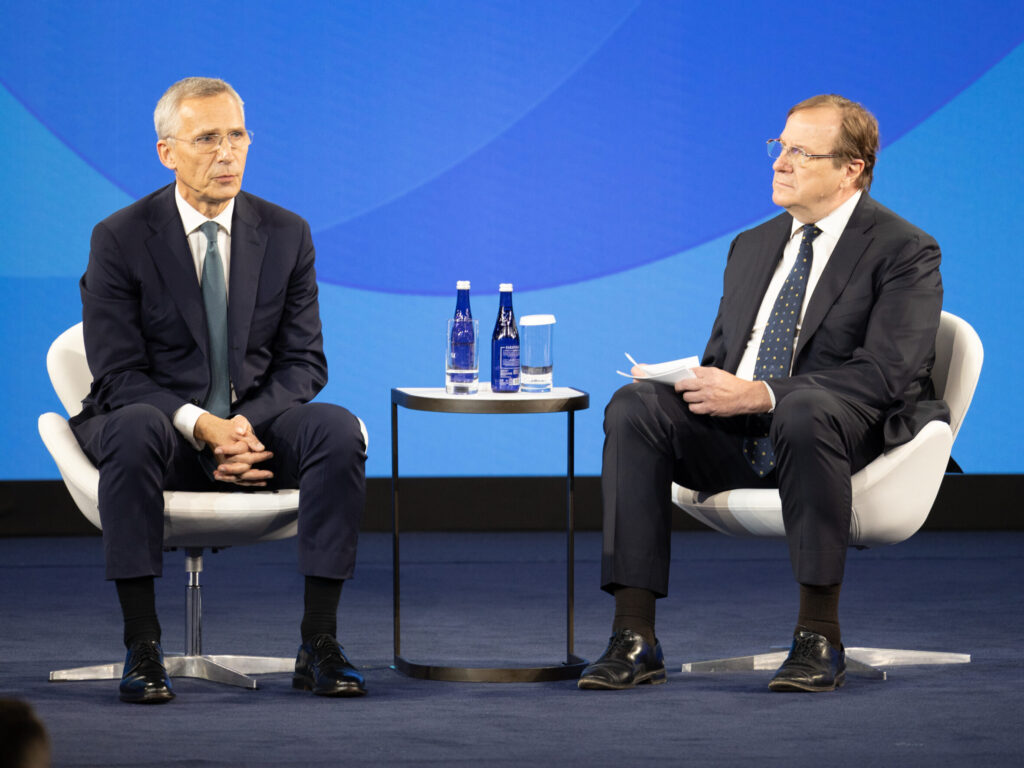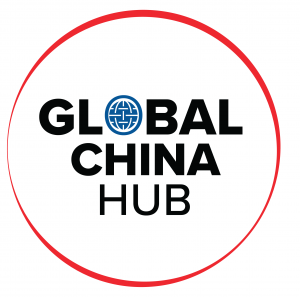Global China Newsletter—Russia’s ‘enabler’ punts again on economic reform
Subscribe to the Global China Hub
Amidst the assertions of commitment to Ukraine’s defense and eventual membership in NATO, conversations at last week’s NATO summit here in sweltering Washington, DC featured another hot topic: China.
The final communiqué, approved by all thirty-two NATO members, took the unprecedented step of calling China “a decisive enabler” of Russia’s war against Ukraine, noting how this is undermining China’s interests and reputation in Europe. NATO Secretary General Jens Stoltenberg underscored that China cannot have it both ways, sponsoring the largest war in Europe in recent memory while attempting to maintain productive relationships across the continent.

These developments on the security front come as European countries with deep ties to the Chinese economy wrestle with how to protect industries from an onslaught of Chinese exports. This dynamic has been most notable in the EU’s recent provisional tariffs on Chinese electric vehicles. While far short of the 100 percent tariffs announced by the Biden administration, Brussels’ move indicates there is growing transatlantic symmetry on derisking relationships with China.
There is far more to be done—not to mention the potential impact of a change in US leadership next year—but a more united transatlantic approach on economic security regarding China does appear to be progressing alongside that on hard security issues.
Meanwhile, as your Global China Editor-in-Chief Tiff Roberts writes below, there is no indication from the Party’s just concluded Third Plenum of hoped-for economic reforms or reduced reliance on emerging and green technology industries—and their export—to spur lagging growth. That’s a recipe for growing confrontation with developed economies, highlighting again the need for continued transatlantic convergence. We cover all this and more below—take it away, Tiff!
-David O. Shullman, senior director, Atlantic Council Global China Hub
China Spotlight
Third Plenum focused on ‘shiny new industries,’, neglected real reform
As Dave notes, many had been hoping China’s just-closed Third Plenum, a once-every-five-year party meeting that usually focuses on the economy, would deliver the reforms needed to jumpstart the country’s lackluster growth. That does not seem to have happened. “Instead of focusing on China’s current problems, the Third Plenum … will prepare China for a confrontation with the United States by building industries powered by massive investments in cutting-edge technologies,” GeoEconomics Center’s Jeremy Mark rightly predicted earlier this month. “China has clearly decided to direct all available resources to next-generation technologies while neglecting to support the vast majority of the population who scrape by outside the tech sector. That suggests Chinese leader Xi Jinping will end up with shiny new industries built on a weak economic foundation.”
As expected, the communiqué, released on July 18, highlighted high tech as well as reiterated Xi’s strident emphasis on the importance of security—something that has spooked both foreign and private investors before. China must achieve a “healthy interaction between high-quality development and a high level of security,” the document stated. And while it name-checked important areas like strengthening consumption and the need to improve “basic and bottom-up livelihood,” there were few specifics about the path ahead. A more detailed document will come later.
(Xi Jinping’s much-anticipated first Third Plenum in 2013 promised ground-breaking reforms to China’s economic system that many expected to see realized. I was far less optimistic, writing at the time of the “central paradox”: China needed major reforms to spark growth but “by pursuing these reforms the party is diluting its control.” That same dilemma remains today.)
The US and EU tariff war with China ramps up as the Global South welcomes Beijing’s embrace
Another big concern is China’s mercantilist trade practices, including subsidized exports undercutting global industries. But while the US and European Union (EU) have taken strong steps to retaliate, putting tariffs on Chinese electric vehicle imports as Dave noted above, Global South countries often welcome Beijing’s economic embrace.
Europe’s tariffs on Chinese EVs max out at 38.1 percent. But, as the Europe Center’s Jacopo Pastorelli and James Batchik write, while this “signal[s] greater alignment between Washington and Brussels on China,” there are differences. Washington’s tariffs will be implemented quickly and applied broadly, yet Europe’s tariffs targeted specific Chinese companies and were “provisional”—a final ruling on tariff levels won’t happen for another four months.
And while a tough approach to China has bipartisan support in the US, “another factor is European unity—or lack thereof,” particularly from export-oriented members, write the report authors. On July 15, Germany, Finland, and Sweden abstained in a non-binding vote on the tariffs, while Italy and Spain voted in favor, with a German economy ministry spokesperson saying “it is now crucial to seek a rapid and consensual solution with China.”
In marked contrast, many Global South countries are throwing their economic lot in with China. Take Peru, whose president Dina Boluarte visited Beijing on June 28. The state visit “follows a decade of increased Chinese economic influence in the Andean country. Between 2018 and 2023, Peru became the second highest recipient of Chinese foreign direct investment (FDI) in Latin America and the Caribbean,” writes the Adrienne Arsht Latin America Center’s Martin Cassinelli. “In 2024, Peru’s relevance to China will be transformed, as Lima becomes a crucial partner in China’s economic engagement with Latin America. In November, Xi plans to inaugurate the Chancay port, a $3.6 billion deep-water mega-port forty-four miles north of Lima.” Other Global South leaders who have recently visited Beijing include top officials from Guinea-Bissau, Vanuatu, Bangladesh, and the Solomon Islands.
NATO says China presents “systemic challenges to Euro-Atlantic security”
As Dave notes above, the just-closed NATO meeting singled out China for criticism like never before. The thirty-two-nation organization declared that China presents “systemic challenges to Euro-Atlantic security,” citing the buildup of its nuclear arsenal, disinformation and cyberattacks. More than anything else, concern centered on China’s role as a “decisive enabler” of Russia’s invasion of Ukraine. “We call on the People’s Republic of China (PRC) … to cease all material and political support to Russia’s war effort,” read the communiqué.
As the below chart shows, China’s trade with Russia is expanding. That trade is helping China to prop up Russia’s “war machine”, writes the Atlantic Council Global Energy Center’s Joe Webster. “While there is no publicly available evidence that Beijing is providing lethal arms to Russian forces, its goods exports are nonetheless likely facilitating Moscow’s invasion,” the senior fellow notes, citing shipments of Chinese machinery, vehicles and parts, and dual-use technologies (In the communiqué, NATO singled out “weapons components, equipment, and raw materials that serve as inputs for Russia’s defense sector”). And it’s not just direct exports. There likely is significant indirect trade via Central Asia and Belarus, with dual-use goods exports more than doubling over the last year. “It is very prudent to examine if China’s shipments…are simply being re-exported on to Russia,” Webster writes.
Meanwhile Hungary, unlike other NATO members, showed strong support for China in recent weeks, continuing a trend that began a decade ago. “Under [far-right leader] Orbán’s leadership, Hungary has oriented its foreign policy around Russian and Chinese interests since 2014, doing the two powers’ bidding inside the European Union and NATO and becoming increasingly hostile to the leaders of the United States and the EU,” writes the Global China Hub’s Zoltán Fehér. Many EU leaders have not taken kindly to Orbán’s meeting with Xi Jinping in Beijing (and earlier with Vladimir Putin in Moscow) just before attending the NATO summit.
ICYMI
- Next Wednesday, the Global China Hub will be co-hosting a public conversation on exposing and countering Chinese information operations in collaboration with the Atlantic Council’s Digital Forensic Research Lab (DFRLab), Radio Free Asia, and Freedom House.
- Atlantic Council President and CEO Fred Kempe and Scowcroft Center for Strategy and Security’s Indo-Pacific Security Initiative Director Markus Garlauskas reflected on their participation in the Atlantic Council’s annual delegation trip to Taiwan in June. The delegation was hosted by the Taiwanese government, and they met with Taiwan government leaders, including President Lai Ching-te, think tanks, and business representatives to discuss security and economic issues facing Taiwan and the Indo-Pacific.
- The Scowcroft Center also published a report, “Strengthening Taiwan’s resiliency,” recommending actions for Taiwan’s new leadership to enhance its societal resilience against Chinese aggression in the context of both “gray zone” conflict and wartime attacks.
- Two years after Elon Musk’s acquisition of Twitter and rebranding as X, the platform is far from winning the battle against spambots. DFRLab led an investigation into how spambots continue to suppress authentic posts in Chinese-language searches on X.

Global China Hub
The Global China Hub researches and devises allied solutions to the global challenges posed by China’s rise, leveraging and amplifying the Atlantic Council’s work on China across its 16 programs and centers.

Follow us on Twitter @ACGlobalChina